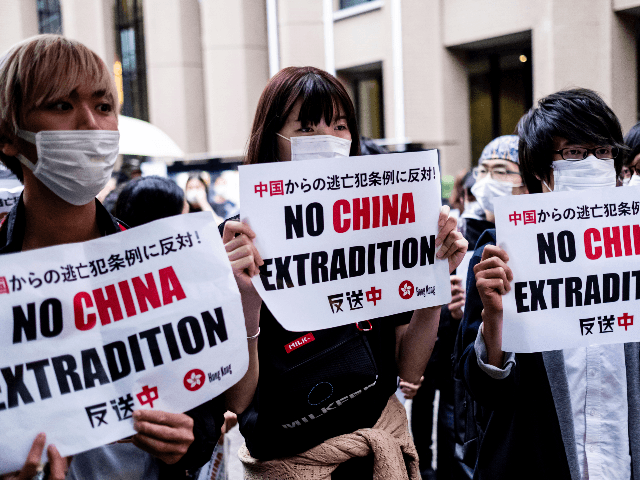Pro-democracy groups in Taipei organized a solidarity protest Tuesday in front of the Hong Kong representative office in Taiwan’s capital against a proposed extradition bill that would grant China access to dissidents in the autonomous regime.
The protest follows a week in which Taiwanese President Tsai Ing-wen urged Taiwanese people to keenly follow the protests in Hong Kong and several politicians and advocacy groups spoke out against the extradition bill.
The bill would allow for the extradition of people in Hong Kong who the Chinese Communist Party believe have broken Chinese law. China considers private religious worship and political dissent crimes, making the tens of thousands in Hong Kong protesting fear that the bill could end the right of free expression in Hong Kong.
Protesters estimated that over one million people attended the march against the bill on Sunday. Another march occurred on Wednesday that attracted thousands, according to some estimates, but turned violent when police began shooting rubber bullets and beating protesters with batons. Police countered criticism by arguing that the protesters were seeking to violently storm the nation’s legislative headquarters.
China considers Hong Kong a “special administrative region” and agreed to allow it to continue self-ruling as a capitalist government when Britain returned it to Beijing in 1997. The system is typically referred to as “one country, two systems” – a separate policy from China’s “One China” approach to Taiwan, which demands that all nations who do business or engage in diplomacy with China disregard Taiwan’s sovereignty.
At the time, China had spent years opening up its markets to the world, convincing many that it had softened its approach to communism. Under current Communist Party leader Xi Jinping, however, China has swung back towards authoritarianism, and colonizing of its neighbors, in dramatic fashion. Getting Hong Kong to submit to communist rule has become one of Xi’s more consistent political campaigns.
According to the Taipei Times, a group of protesters representing over 20 advocacy groups congregated outside the Hong Kong representative office Tuesday chanting “Shame on you, Hong Kong government” and “Say no to the extradition bill” in solidarity with the protesters. Many were from groups based in Taiwan, but others represented international NGOs like Human Rights Watch and Amnesty International.
Those who attended the Taiwan protest said they were also advocating for Taiwan to take action by revoking special legal status to Hong Kong politicians and businessmen with ties to China if Hong Kong passes the extradition bill.
The New Power Party (NPP), an offshoot of the anti-China “Sunflower movement” founded in 2015, issued another call for Tsai to consider revoking special status for Hong Kong officials if the bill passes.
“Do not let Hong Kong’s freedom get the death penalty,” the party said in a statement, adding that Taiwan should also consider preparing the legal groundwork to give Hong Kong dissidents political asylum if the bill passes.
Students from Hong Kong studying in Taipei also planned a walkout in their universities in support of protesters back home.
Taiwan’s President Tsai Ing-wen, who has frequently angered the Chinese government by asserting her nation’s sovereignty, issued a statement on Facebook Sunday following the first wave of Hong Kong protests urging Taiwanese to stand alongside the people of Hong Kong.
“Anyone concerning themselves with freedom, democracy and human rights around the world will also be following the march, and will also be very supportive of the people of Hong Kong,” she wrote. “Taiwan is no exception, and we also support the people of Hong Kong in their pursuit of freedom, democracy and human rights. Freedom is like the air: you only become aware of its existence when you start to suffocate.”
“As in Taiwan, we support the pursuit of freedom, democracy, and human rights by Hongkongers,” she added. “I call on the Taiwanese people to continue to care about the development in Hong Kong. Let’s show our support and safeguard Taiwan.”
Tsai wrote that the deeper problem than the extradition bill is “one country, two systems,” which grants China too much power. She called the policy “absolutely unacceptable to Taiwan” and warned that imposing such a system would mean Taiwan would “lose the right to defend freedom, democracy and human rights, and lose the right to decide on our own future.”
The Hong Kong protests provided a rare moment of agreement between Tsai and the opposition Kuomintang Party (KMT). Mayor Han Kuo-yu of Kaohsiung, who is running against Tsai in the 2020 election, did not support the protests (“I have no idea,” he responded to a question on them), but he did dismiss “one country, two systems” as a failure.
“Do we even have to talk about it? Everyone knows [it doesn’t work],” he reportedly said, adding, “I would like to express my unquestionable determination to defend the Republic of China, Taiwan’s democratic system and its lifestyle.”

COMMENTS
Please let us know if you're having issues with commenting.